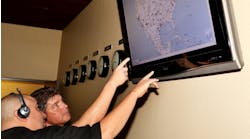United Rentals, the industry’s largest rental company, last week reported significant revenue improvements in the second quarter. The Greenwich, Conn.-based company reported total revenues of $776.0 million, an increase of 6.6 percent compared with $728.1 million for the second quarter of 2003 and second-quarter 2004 revenues for the general rentals segment were $709.4 million, an increase of 11.9 percent year over year. Operating income for the second quarter of 2004 was $107.1 million, an increase of 13.2 percent compared with $94.6 million for the second quarter of 2003. Adjusted net income for the second quarter of 2004 was $41.5 million and adjusted diluted earnings per share were 42 cents, compared with net income of $23.4 million and diluted earnings per share of 25 cents for the second quarter of 2003. After recognizing a $6.5 million charge, net of tax, relating to the debt refinancing completed in the second quarter of 2004, the company reported GAAP net income of $35.0 million and GAAP diluted earnings per share of 36 cents.
Dollar utilization for the second quarter of 2004 was 60.1 percent, an increase of 2 percentage points year over year. The size of the rental fleet, as measured by the original equipment cost, was $3.7 billion at the end of the second quarter of 2004. The average age of the rental fleet was 39 months, and CEO Wayland Hicks said that age would not change significantly before the end of the year. However, United has significant increased its capex spending. The company spent $322 million on fleet in the first half of 2004, an increase of $56 million year over year and almost equal to the $336 million the company spent for all of 2003.
For the first half of 2004, the company reported total revenues of $1.42 billion, an increase of 7.6 percent compared with $1.32 billion for the first half of 2003. First half 2004 revenues for the general rentals segment were $1.31 billion, an increase of 11.6 percent over the $1.17 billion in revenues for the first half of 2003. Adjusted operating income for the first half of 2004 was $147 million compared with operating income of $134.9 million for the first half of 2003. Adjusted net income for the first half of 2004 was $35.6 million and adjusted diluted earnings per share were 36 cents compared with net income of $14.7 million and diluted earnings per share of 16 cents for the first half of 2003.
“Our adjusted diluted earnings per share this quarter were up 68 percent from last year's second quarter and exceeded our expectations,” said Hicks. “These results reflected the strong operating performance in our general rentals segment and a substantial reduction in interest expense due to recent refinancings, partially offset by disappointing results in traffic control.”
Hicks said rental rates for the second quarter increased 7.9 percent over the same period in 2003 and same-store rental revenues increased 9.6 percent year over year. Hicks predicted on an annual basis, rental rates would likely rise 5 to 6 percent for the entire year. Rental revenues generated by sharing equipment between branches improved to 13.2 percent in the second quarter of 2004, compared with 12.4 percent in the second quarter of 2003. Segment operating income was $118.3 million for the second quarter of 2004, an increase of 33.6 percent compared with $88.5 million for the second quarter of 2003.
"In general rentals, the 11.9 percent increase in total revenues included a 9.6 percent increase in same store rental revenues, which was largely driven by our success in raising rental rates by 7.9 percent,” said Hicks. “This performance significantly outpaced our principal end market, private non-residential construction, which was up only slightly during the first five months of 2004. The impact of the revenue growth on profitability was enhanced by our operating leverage, resulting in general rentals operating income growth of 33.6 percent.”
Hicks continued, “As a result of our positive rental rate trend and lower interest expense, we are raising our full year outlook for diluted earnings per share, excluding charges, to $1.20 from the previous range of $1.00 to $1.10.”
Second-quarter 2004 revenues for the traffic control segment were $66.6 million compared with $94.0 million for the second quarter of 2003, a decline of $27.4 million. Same-store rental revenues in the second quarter declined 32.9 percent from the second quarter of 2003. The segment operating loss for the second quarter was $11.2 million compared with segment operating income of $6.1 million for the second quarter of 2003, a decline of $17.3 million.
First half 2004 revenues for the traffic control segment were $112 million compared with $147.1 million for the first half of 2003, a decline of $35.1 million. Same-store rental revenues in the first half declined 25.4 percent from the first half of 2003. The segment operating loss for the first half was $25 million compared with the segment operating loss of $2.4 million for the first half of 2003, a decline of $22.6 million. United president and chief operating officer John Milne said the company already cut costs in the traffic control segment by $10 million, including a workforce reduction of about 15 percent. Milne said United is considering closing or consolidating traffic control branches in the second half of 2004.
United Rentals is No. 1 on the RER 100.




